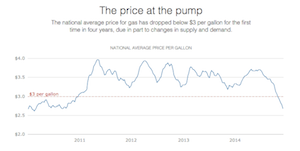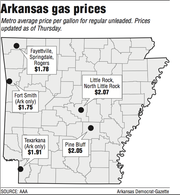Motorists in Arkansas are filling up with some of the cheapest gasoline in six years, the result of a turbulent oil market heavy with supply.
Average prices for regular grade gasoline Thursday ranged from $1.75 a gallon in the Fort Smith area to $2.07 a gallon in the Little Rock-North Little Rock metropolitan area.
Analysts said the range is generally a result of a volatile oil market.
"We haven't hit bottom on crude prices. More likely, that is going to happen early spring, which means gasoline prices could go down a little bit further," said James Williams, an energy analyst who operates WTRG Economics near Russellville.
As long as crude prices remain unstable, so will prices at the pump, analysts said.
"It's been such a disorderly route," said Tom Kloza, chief oil analyst for gasbuddy.com, a price-tracking website. "There are a lot of things that aren't typically normal; you've got these disjointed numbers."
Oversupply and declining demand worldwide have put the oil market in a tailspin. Prices have dropped more than 50 percent since summer.
The price of West Texas Intermediate crude fell $2.23 to settle at $46.25 a barrel Thursday on the New York Mercantile Exchange. Brent crude fell $1.02 to $47.67 on the ICE Futures Europe exchange in London.
Retail gasoline prices will average $2.33 a gallon nationwide this year, down from $3.36 in 2014, leading the average household to spend about $750 less on fuel this year, the energy administration said Tuesday in a monthly report.
"We are going to be cheap for a while; there's not a question about that," Kloza said, adding that most markets will see gasoline prices dip below $2 a gallon.
Prices already are heading that way with gasoline averaging $2.09 a gallon nationwide Thursday. In Arkansas, the average was $1.95, according to AAA's Daily Fuel Gauge.
"A lot of things go into pricing," said Don Redman, a spokesman for the auto club. "Primarily the main thing is oil."
Oil typically makes up 50 to 70 percent of retail gasoline prices. Along with that are marketing and distribution costs, and any state or local taxes, Redman said.
Some gas stations also are locked in to higher prices because they entered into contracts before prices dropped.
Retail gasoline prices normally rise faster than they fall, especially when stations mark up prices to pay for their next delivery, Redman said.
"Historically, service stations tend to make a little more windfall when prices fall than when they increase because they can decrease that by pennies," he said.
Two other important factors in pricing are location and transportation.
The distance between a market and a refinery adds to fuel transportation costs. Delivery via pipeline is generally cheaper then rail, barge or truck, analysts and industry members said.
Most of the gasoline in central Arkansas comes from the Gulf Coast while the western part of the state gets its fuel from refineries in Oklahoma, said Aaron Littlefield, president of supplier Littlefield Oil Co. in Fort Smith.
"The closer you get to the Gulf Coast in Texas the cheaper [prices] are going to be in general," said Sam Margolin, an analyst with Cowen Group Inc.
However, he said, "Oklahoma has the cheapest gasoline prices in the country right now," because refineries in that state are closer to Cushing, Okla., an oil hub.
Higher retail gasoline prices in central Arkansas could be the result of higher transportation costs, analysts said.
"There's some type of transportation issue," Margolin said, adding that it might be related to recent pipeline changes in the state.
Enterprise Products Partners ended shipments of diesel and jet fuel to El Dorado, North Little Rock and Jonesboro on one of its pipelines in 2013 in a move to reverse the line's flow and transport the gas ethane from the Northeast to the Gulf Coast.
The company has a parallel, 20-inch line that moves gasoline and other distillates, such as diesel fuel, to customers, including Murphy USA.
"I don't have any insight into how retailers establish the price at the pump, but as far as delivery of gasoline and diesel through our pipeline is concerned, that rate is dictated and controlled by the terms of our tariff, which is approved by the federal government," said Rick Rainey, a spokesman for Enterprise, in an email.
Phillip Wallace, a representative with Pipeliners Local Union 798 in Bald Knob, said the changes to the Enterprise pipeline are likely a factor in the higher central Arkansas gas prices.
"When they reversed that flow that did hurt the area," he said. "The cheapest, safest way to transport liquid products is through a pipeline and we don't have those products running into here; they have to be trucked."
A new pipeline project will help lower fuel costs in central Arkansas, Wallace said.
Magellan Midstream Partners is building a 12-inch pipeline to connect the Little Rock market to a terminal in Fort Smith. Magellan will build about 50 miles of new pipe and connect it to an existing 160-mile line it will lease.
Designed to move up to 75,000 barrels per day of refined product, the pipeline is set to begin operation in 2016.
"We believe having access to additional refineries in Oklahoma and Kansas ... will be beneficial to consumers," said Bruce Heine, a spokesman for Magellan.
The cost of gasoline at the pump eventually will start to increase later in the year, but in the meantime consumers can expect further decline and volatility in prices, analysts said.
"If it goes down, fill up," Williams in Russellville said. "If it goes back up, wait a day."
A section on 01/16/2015

